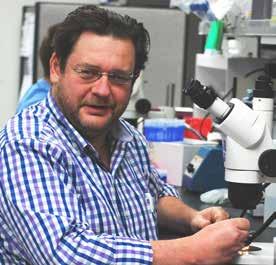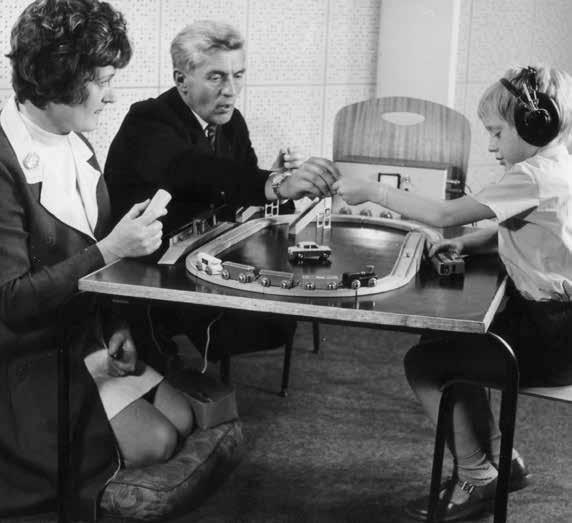
4 minute read
Research A Vision for Hearing Research: Peter Steyger, Ph.D
100,000 people
In the U.S. are treated annually with aminoglycoside antibiotics, whose common side effect is hearing loss.
Advertisement
500,000 people
In the U.S. are treated annually with chemotherapy drugs, which can cause hearing loss.
A Vision for Hearing Research
A childhood hearing loss has driven a lifelong interest in hearing research for Peter Steyger, Ph.D., a member of Hearing Health Foundation’s Council of Scientific Trustees, and the director of Creighton University School of Medicine’s Translational Hearing Center.
When he was 14 months old, Peter Steyger, Ph.D., contracted bacterial meningitis. Physicians in his native Manchester, England, managed to save his life through a course of aminoglycoside antibiotics, but a side effect of those drugs robbed him of his hearing. Some 50 years later, Steyger, with a doctorate in neuroscience and hundreds of publications on ototoxicity and cochlear anatomy, has dedicated his life and career to preventing a similar fate for other children. In May 2019, Steyger joined Creighton University in Omaha, Nebraska, as the director of the School of Medicine’s Translational Hearing Center in a move that he says is “a dream scenario that will help me fulfill my life’s goals.” Steyger spent more than two decades at the Oregon Health & Science University and the Oregon Hearing Research Center.
The center will collaborate with Boys Town National Research Hospital and the University of Nebraska Medical Center. The expansive effort, Steyger says, makes it all the more likely that researchers will make significant breakthroughs. “We can move with more velocity,” he says.
Steyger holds a major National Institutes of Health (NIH) grant and has another, a $3.5 million grant from the NIH’s National Institute on Deafness and Other Communication Disorders, on the way. The grants are dedicated to preventing, through clinical or pharmaceutical interventions, the kind of hearing loss Steyger experienced.
Jian Zuo, Ph.D., chair of the department of biomedical sciences, will head up drug design for the center. “There is a lot of synergy on this, a lot of interprofessional collaboration that is making this possible,” says Zuo, who is working on a project to target at what point and in what populations antibiotics or chemotherapy drugs for cancer affect hearing.
“There are some very promising pathways that Dr. Steyger has identified, and some compounds that we’ve identified,” Zuo adds. “The great thing is that our vision, our goals, are identical in this: to develop the first drug that could prevent this kind of hearing loss in children.”
Steyger notes the incidence of hearing loss for children in the U.S. under the age of 2 is about 1 in 200, typically caused by trauma, infection, or antibiotic drugs. By age 18, about 1 in 20 experiences hearing loss. From there, the frequency increases with age-related hearing loss added into the mix.
Left: As a child in the late 1960s, Peter Steyger practices enunciation during intensive daily speech therapy.

Above: Steyger today.
Since he was 2, Steyger has been outfitted with the latest in technological advances in hearing aids and cochlear implants that, ironically, give him an advantage as he gets older and hears better.
“Many in my age bracket are now experiencing age-related hearing loss,” he says. “I’m going the other way. The technology is really amazing in rehabilitating hearing loss. But what would be even better is if we could prevent hearing loss in the first place and give everyone that natural ability to hear.”
In any given year, some 100,000 people in the U.S. are treated with aminoglycosides, the antibiotics that caused Steyger’s hearing loss, and up to another 500,000 are treated with chemotherapy drugs that cause hearing loss. Developing an effective compound to forestall that side effect is the center’s primary aim. The center will also examine the potential to restore hearing via repairing or replacing damaged cochlear hair cells.
The department of biomedical sciences also has launched a new Bellucci Symposium on Hearing Research, sponsored by the Bellucci DePaoli Family Foundation and named for School of Medicine alumnus Richard J. Bellucci, M.D., an innovator in ear surgery techniques to treat conductive hearing loss. Steyger is eager to continue the research that was, for him, set into motion when he was a youngster. “It gets me up out of bed in the morning,” he says. “I’m very passionate about this, and it keeps me motivated when setbacks occur. It’s a way to pay forward the support I have received in the past. Hearing is vital to communication. Perceiving sound is integral to music, listening to stories, theater. That all contributes to the richness of human experience.”
This is adapted from the Summer 2019 issue of Creighton Magazine, at creighton.edu/creightonmagazine. Share your story: How has a hearing or balance condition affected your career? Tell us at editor@hhf.org.
Support our research: hhf.org/donate









